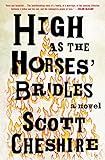It’s been a good year in reading for me.
Old stuff:

 I finally finished Parade’s End and started reading Middlemarch. The last three novels of Parade’s End I read in a sustained burst of reading, but I’ve been taking Middlemarch very slow, pausing from time to time amidst an increasingly hectic year to read a chapter here or a chapter there as a treat to myself.
I finally finished Parade’s End and started reading Middlemarch. The last three novels of Parade’s End I read in a sustained burst of reading, but I’ve been taking Middlemarch very slow, pausing from time to time amidst an increasingly hectic year to read a chapter here or a chapter there as a treat to myself.
I also started reading more Jonathan Edwards. I’d only known his sermon “Sinners in the Hands of an Angry God,” which I’d read in high school, and I was delighted to discover how much more there was to him. Of particular note, for me, is his essay, “Concerning the Nature of True Virtue.”
New stuff:
 Scott Cheshire’s High as the Horses’ Bridles astounded me for several reasons. There are pieces in the book that are just dazzling displays of skill: a child sermonizing before a crowd of thousands in the 1980’s, a tent revival in the 19th century, a richly layered description of a taxi-ride through Queens. There’s a profound and searching look at religion and the loss of religious belief. And there’s just an incredibly beautiful generosity to the book, a warmth to it even in its darker passages.
Scott Cheshire’s High as the Horses’ Bridles astounded me for several reasons. There are pieces in the book that are just dazzling displays of skill: a child sermonizing before a crowd of thousands in the 1980’s, a tent revival in the 19th century, a richly layered description of a taxi-ride through Queens. There’s a profound and searching look at religion and the loss of religious belief. And there’s just an incredibly beautiful generosity to the book, a warmth to it even in its darker passages.
Probably the most sheer delight I experienced reading a book this year was with Jason Porter’s Why Are You So Sad? It’s a short little book that, despite being an absolutely zany satire, packs a serious emotional punch. And it’s hilarious. I found myself reciting lines to my wife and friends as I read it. And it has one of the best descriptions of a groggy work morning that I’ve read, beginning: “Waking up was like reversing a burial……..”
Matthew Thomas’s We Are Not Ourselves is just a stunning, stunning book. A huge, ambitious story that spans three generations, unflinchingly explores the deterioration of one character’s mind, and has a main character who goes to my high school (Regis, to which Thomas also went, though we did not overlap). Possibly the most emotionally engaged I’ve been with any book this year.
 Vanessa Manko’s The Invention of Exile is a book that powerfully evokes the effects of political paranoia on individuals and families. Though it’s 1930’s anti-Soviet paranoia that strikes Austin Voronkov’s family, Manko’s main characters’ struggles are no less pertinent today.
Vanessa Manko’s The Invention of Exile is a book that powerfully evokes the effects of political paranoia on individuals and families. Though it’s 1930’s anti-Soviet paranoia that strikes Austin Voronkov’s family, Manko’s main characters’ struggles are no less pertinent today.
I read a lot of great military-related books this year. The standouts are Rick Atkinson’s The Long Gray Line and Neil Sheehan’s A Bright Shining Lie, both truly remarkable works of non-fiction about Vietnam. Elizabeth Samet’s No Man’s Land is a thoughtful, idiosyncratic, and moving look at the modern American military, how it prepares for war, and its relationship to the rest of America.
 I read plenty of great poetry this year (Ted Kooser, Cynthia Huntington, Louise Gluck), but my favorite was Tom Sleigh’s Station Zed, a profound, sometimes uncomfortably incisive book. Sleigh’s essay for Poetry Magazine on the WWI writers Wilfred Owen and David Jones is brilliant, and this book is the proof that he lives up to theoretical challenges he poses in that essay for anybody daring to write about conflict zones. Just as good are the non-war poems. I just finished it, but have been carrying it around with me because I keep needing to go back to reread poems.
I read plenty of great poetry this year (Ted Kooser, Cynthia Huntington, Louise Gluck), but my favorite was Tom Sleigh’s Station Zed, a profound, sometimes uncomfortably incisive book. Sleigh’s essay for Poetry Magazine on the WWI writers Wilfred Owen and David Jones is brilliant, and this book is the proof that he lives up to theoretical challenges he poses in that essay for anybody daring to write about conflict zones. Just as good are the non-war poems. I just finished it, but have been carrying it around with me because I keep needing to go back to reread poems.
Karen Russell’s Sleep Donation is, like all her fiction, weird, hilarious, and brilliant. The consumption of the spectacle of emotional suffering, paranoia over dream contagion, the commodification of charity, a wood-paneled car with termites — what’s not to love?
More from A Year in Reading 2014
Don’t miss: A Year in Reading 2013, 2012, 2011, 2010, 2009, 2008, 2007, 2006, 2005
The good stuff: The Millions’ Notable articles
The motherlode: The Millions’ Books and Reviews
Like what you see? Learn about 5 insanely easy ways to Support The Millions, and follow The Millions on Twitter, Facebook, Tumblr.









